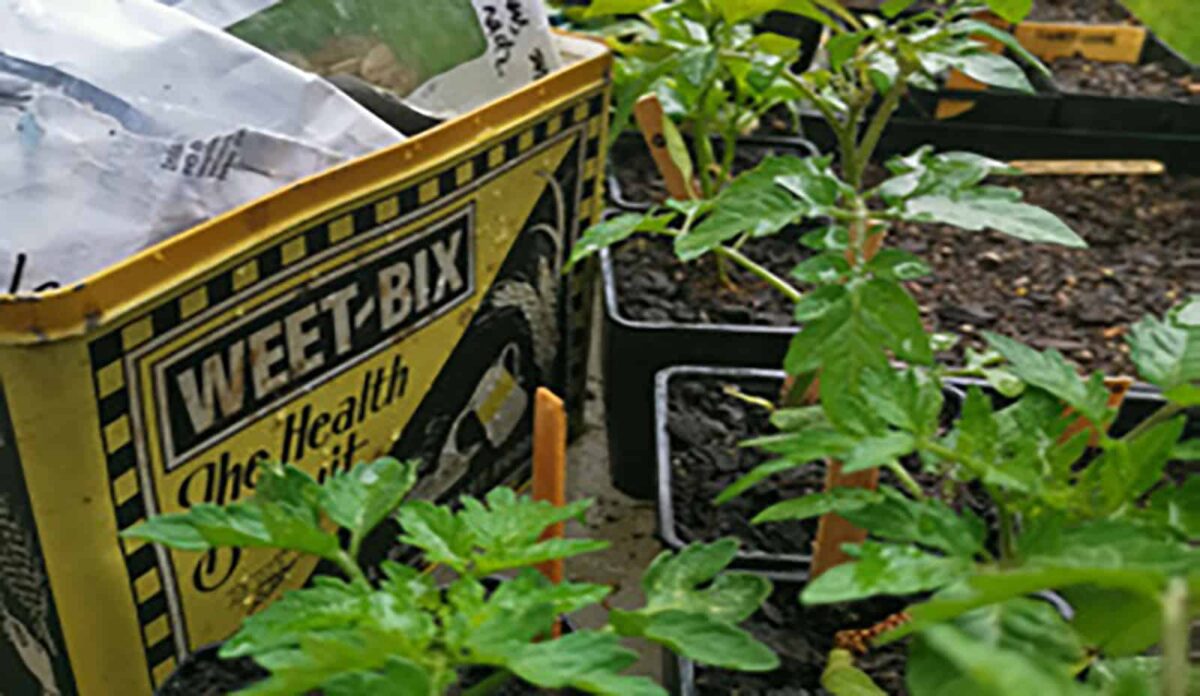It’s the time of year when the light changes. Shining bright and white, it bounces off spring blossoms and new growth, extending its reach into the farthest corners of our whare. This springtime light highlights the dust and ash, settled deep from winter fires, and the scale left by rain on our window panes. It’s no wonder that we feel a primal urge to spring clean our homes and bodies.
Now, I’ll admit here that I’m not the kind of person who rushes towards housework, no matter how glaring. So, possibly as a convenient distraction, this time of year also sees me reaching into a dark upper cupboard of our kitchen for an old, warped Weetbix tin. Battered as the tin is, it holds treasure. I pull out a pile of brittle packets containing seeds that have been saved by our children and friends. Most of the packets are brown paper bags or repurposed window envelopes. I delight in the thought that these envelopes, which once held rates notices, appointment reminders and bills, now hold tiny promises of a golden summer of fresh tomatoes and beans. For me, these packets become small gestures of poetic justice.
Every year as I pull the packets out, I cluck with worry that I have left this task a fortnight too long. Before I can chide myself too far however, I watch our children reacquaint themselves with the shapes and textures of the seeds. They so easily reach for memories – of the perfect pod of peas, or that year we had sweet melons daily, or the rhyme they invented when planting butter beans. Stories flow quickly from them and not one of the three children ever remember the hours of weeding and watering. It may be that in this moment of heaped potential, they know that the work will be worthwhile. Or more likely, it’s that gardening doesn’t actually feel like work to them at all.
In our seven years of creating a whānau-scale garden here at Mangatahi, we’ve fallen into a natural rhythm with other whānau in town. It’s simple really: we share the mahi of the garden, and then the spoils. Whānau come to help dig and plant, then harvest and preserve the fruit and veg. Our produce goes into these homes and beyond, to other whānau who want or need it. This is the unspoken exchange that we’ve fallen into together and has grown to be our collective way of being here, together. So much so, that many of our town whānau turn up with gummies, spades or seedlings in their car boot, and even a quick cuppa ends with us in the garden.
Though this loose arrangement is fairly simple, the value is multi-layered. While we weed, dig, plant or pick; the alchemy of soil-on-skin brings good humour and perspective to even the most barbed topics of conversation. Our growing kai hears so much raucous laughter, along with waiata, political musings and our quiet hopes for the future. Our soil is fortified with spilt tea and tears, and the play of children. All of our collective children join forces in hunting slugs, making mud cities and pondering over eternal questions such as: “Is this one a weed?” and “Can I eat it?”
From summer through to autumn, a couple of the families bring back seeds from our harvested produce. Carefully collected, dried and resplendent in their revolutionary window envelopes, the seeds for another spring are stored away in the trusty, rusty Weetbix tin. Even as I write this, at our kitchen table littered with the last of our winter citrus, avocado toast and the contents of our seed tin, I marvel at the forethought of those seed savers. It’s here where the cycle actually ends for us, not at harvest. The cycle of our whānau garden cannot begin again in earnest without our seeds. It cannot begin without the stories and the memories in those seeds.
On this same kitchen table, lies two bright sealed window envelopes. Filled not with seeds, but with voting papers.
As I work my way through the pamphlet of candidate statements, I think about how it reads like the back of store-bought seed packets. Each one with their ideal growing conditions, and potential yield. I think about what I want to see growing in our region. I think about which corners of our community are highlighted by this active springtime light. I think about what yields we’ve had in the past, and what’s not grown well. Mostly, I think about the stories and the memories.
Then I ask myself, who will save the seeds? In due course these orange coloured envelopes will be filled and tucked into the Weetbix tin as well. What stories will come with the seeds they contain, come next spring? We’ll have to see this cycle through, see what there is to harvest, and watch well over our whānau garden, together.

